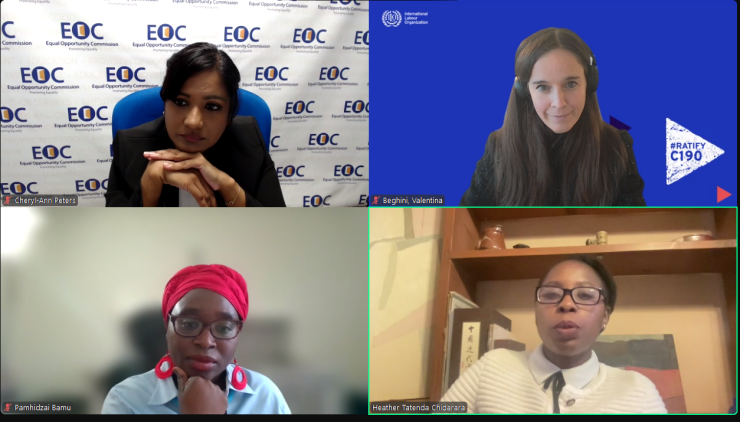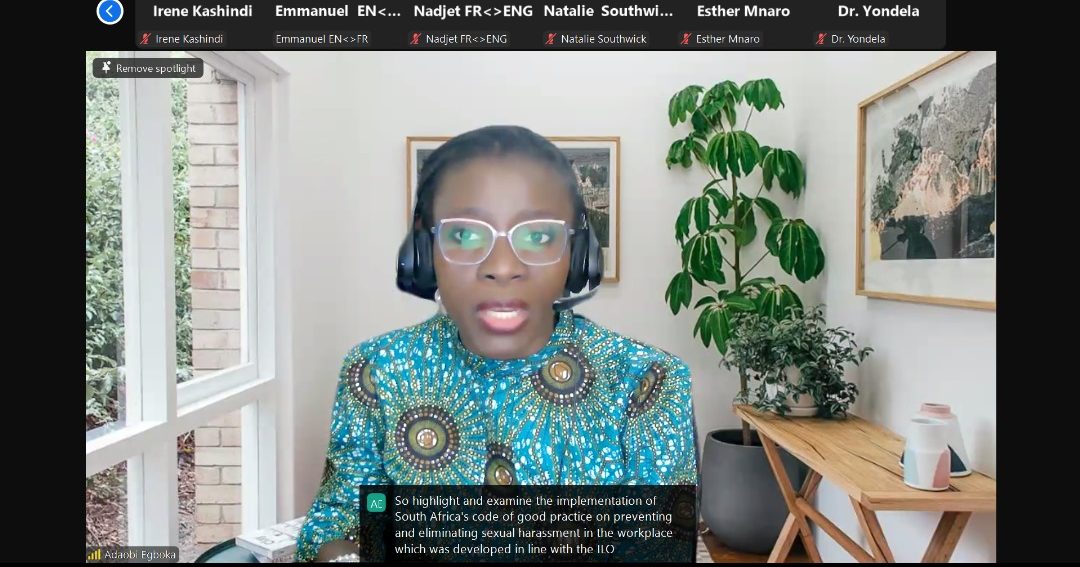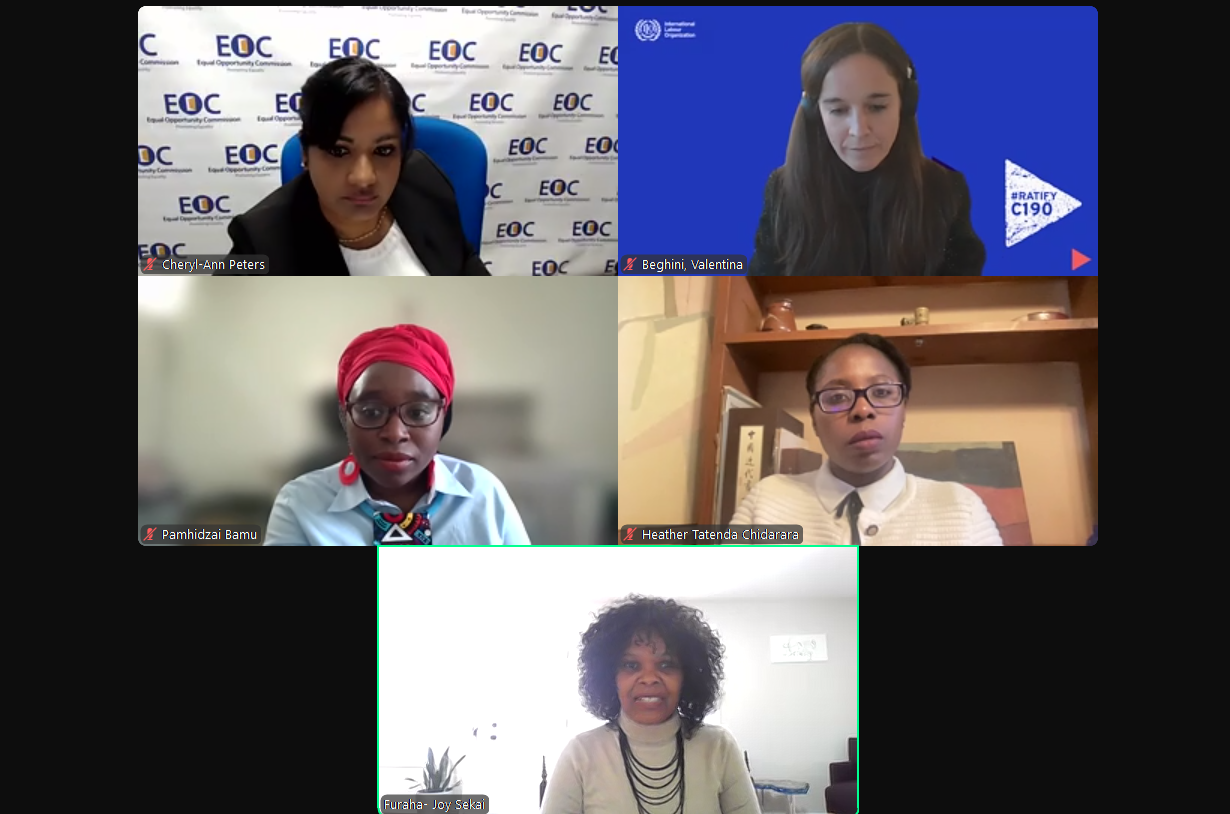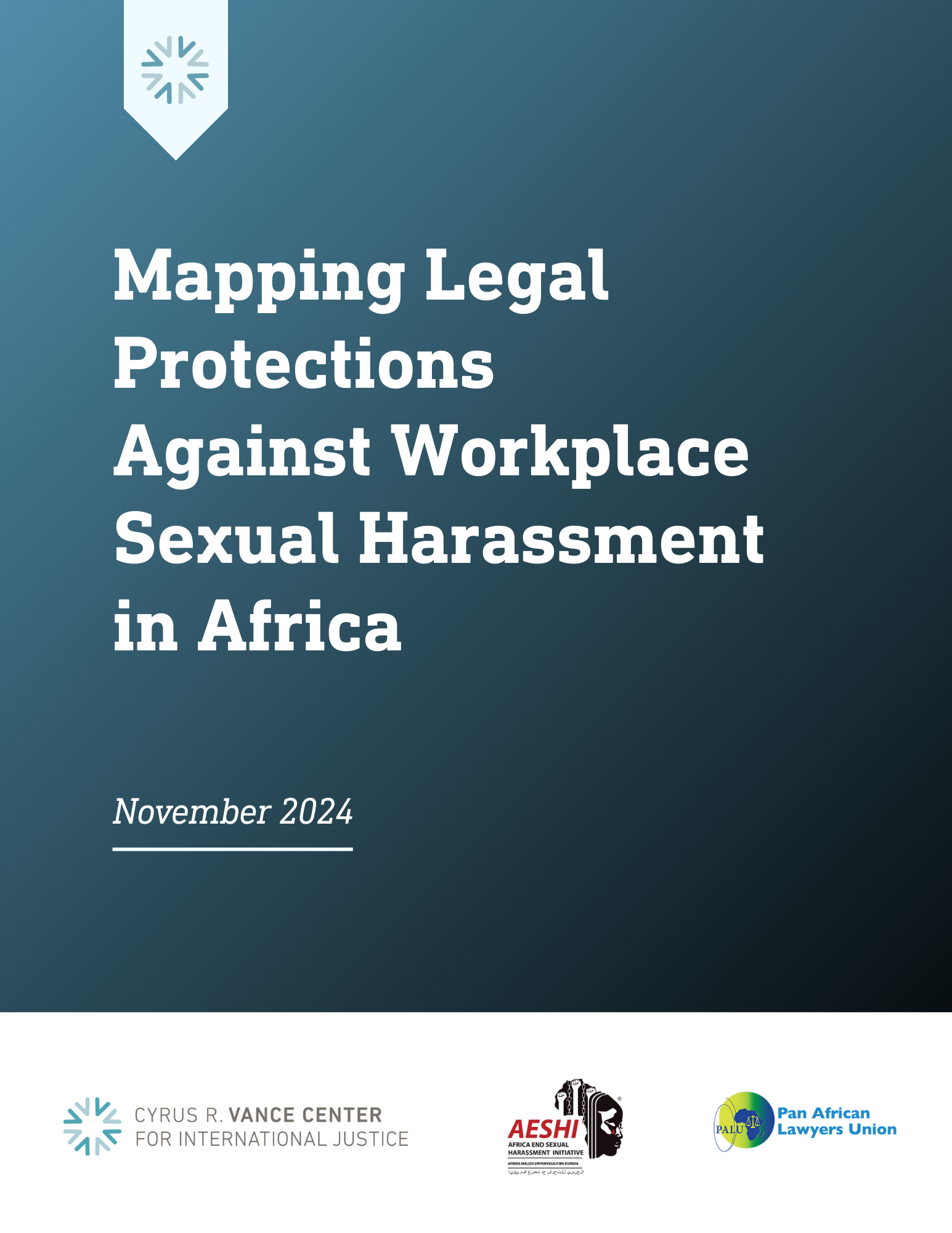This website uses cookies so that we can provide you with the best user experience possible. Cookie information is stored in your browser and performs functions such as recognising you when you return to our website and helping our team to understand which sections of the website you find most interesting and useful.
Vance Center, AESHI & PALU Launch New Report on Sexual Harassment Laws in Africa
November 2024The Vance Center joined partner organizations for a two-day virtual event to launch the report, which examines existing frameworks in 22 countries and sets a foundation for a regional model law to address workplace sexual harassment.

Clockwise from top left: Speakers Cheryl Ann Peters, Valentina Beghini, Heather Tatenda, and moderator Pamhidzai Bamu discuss potential approaches to a model law on sexual harassment during the second day of the virtual launch, November 22, 2024.
On November 21 and 22, the Vance Center, along with the Africa End Sexual Harassment Initiative (AESHI) and Pan African Lawyers Union (PALU), hosted a virtual launch event with the theme “In Law and Practice: Unifying Africa to End Sexual Harassment.” More than 100 attendees connected from across time zones over the two days to learn about the report’s findings, discuss the context of workplace sexual harassment in African countries, and consider the next steps toward a more equal world of work.
The report, “Mapping Legal Protections Against Workplace Sexual Harassment in Africa,” for the first time compiles and analyzes existing legislative protections and policies addressing sexual harassment in 22 jurisdictions across Africa. The analysis finds that the current fragmented approach to defining and addressing sexual harassment is insufficient to ensure the broad protections necessary to protect workers in the formal and informal labor markets across Africa. Based on this conclusion, the three organizations are calling on institutions to take concrete steps toward establishing a regional framework and model law on sexual harassment for Africa.
The report’s launch coincided with the beginning of the 16 Days of Activism against Gender-Based Violence, an annual international campaign to combat violence against women and girls that starts on November 25. The launch event offered a chance to open a cross-border conversation about efforts to confront sexual harassment in African workplaces, and framed the discussion within the scope of the campaign, recognizing workplace sexual harassment as a pervasive form of gender-based violence.

Virtual Launch
Both days of the virtual launch began with an introduction from representatives of the three coordinating organizations: the Vance Center, PALU, and AESHI.
Vance Center Africa Program Director Adaobi Egboka then guided attendees through the rationale behind the report, its methodology and key findings. She highlighted the concerning persistence of sexual harassment in Africa, despite several strong international and regional mechanisms that address it, and emphasized the importance of institutions like bar associations, universities, and private companies leading the movement to implement and enforce effective policies on sexual harassment.
In a keynote address, Abiola Idowu-Ojo, Executive Secretary of the African Commission on Human and Peoples’ Rights, detailed existing mechanisms related to sexual harassment and outlined key gaps in enforcement and accountability within those agreements. She underscored the urgent need for comprehensive and actionable solutions to combat sexual harassment across the continent and encouraged civil society groups to continue monitoring, reporting, and litigating cases to develop jurisprudence in this area.
Following the keynote, moderator Simone Solange Feoketchang Kouatchou, co-chair of PALU’s Women Lawyers Forum Committee, led participants through a discussion of “Sexual Harassment in Africa: Legal Frameworks, Practices and Pathways to Change.”
Chinwe Odigboegwu, an experienced General Counsel and member of the Advisory Board for the Nigerian chapter of the Vance Center’s Women in the Profession Program, addressed the disconnect between good policies on paper and actual enforcement in the working world, and the need for more serious consequences for perpetrators of sexual harassment. PALU President Donald Deya spoke about ongoing gender inequity within African law firms and the importance of working on multiple fronts, from strategic litigation before African regional mechanisms to institutional policies. Dr. Yondela Ndema, Executive for Group Ethics & Compliance at Barloworld South Africa, clarified the distinctions between ethics and compliance and how companies can encourage employees to come forward with complaints. Labor law expert Irene Kashindi FCIArb, Partner at Munyao, Muthama & Kashindi Advocates in Kenya, applauded the growing awareness of policies on sexual harassment but pointed to the need for more effective implementation. The panel concluded with closing words from AESHI founder and regional coordinator Furaha-Joy Sekai Saungweme, and a call for attendees to return the following day.

Speakers during the virtual launch event, November 22, 2024.
The next day’s conversation began with the report presentation, then looked ahead “Towards an African Regional Model Law on Sexual Harassment: Policy Approaches and Frameworks for Africa.” Pamhidzai Bamu, Law Programme Coordinator for Africa at Women in Informal Employment: Globalizing and Organizing (WIEGO), moderated the discussion of opportunities and next steps at the regional level.
Valentina Beghini, Legal Specialist at the International Labour Organization (ILO), delved into the history of ILO Convention 190, how the phrase “world of work” was chosen to ensure the convention would cover informal sectors, and ongoing challenges for more widespread ratification. Cheryl Ann Peters, Legal Officer at the Equal Opportunity Commission of Trinidad and Tobago, and an active participant in efforts to draft a model bill on sexual harassment for the CARICOM region, brought a cross-hemisphere perspective to the discussion. She outlined the Commission’s efforts to create sexual harassment guidelines in Trinidad, and offered insights from the ongoing process for the Caribbean region. Heather Tatenda, Anti-Harassment Counsel at the World Bank, detailed similar efforts at the World Bank, and emphasized the essential role of international cooperation for crafting effective policies on harassment.
The Vance Center’s Adaobi Egboka concluded the discussion, presenting an action plan with next steps for the three organizations to disseminate the report and advocate for legal and institutional reforms in Africa.
Report: Mapping Legal Protections Against Workplace Sexual Harassment in Africa
The report analyzes legal frameworks in 22 countries: Algeria, Angola, Botswana, Cameroon, Egypt, Equatorial Guinea, Ethiopia, Gambia, Ghana, Ivory Coast, Kenya, Malawi, Mozambique, Namibia, Nigeria, Rwanda, Senegal, Sierra Leone, South Africa, Tanzania, Uganda, and Zimbabwe.
It outlines laws and regulations addressing sexual harassment, including international and regional agreements that each country has signed or ratified. The analysis also covers legal requirements for institutions to implement policies on sexual harassment, mechanisms for reporting and investigating cases, arbitration or litigation of cases, and penalties and consequences for perpetrators.
Among the report’s findings:
- Just a handful of African countries have ratified two key International Labor Organization conventions related to workplace protections for women. Only five countries have ratified ILO Convention 189 (Domestic Workers), and only eight countries have ratified ILO C190 (Violence and Harassment in the World of Work).
- Even though nearly half of African countries have some form of law prohibiting sexual harassment as of 2024, such laws vary widely from one country to another and often lack any enforcement mechanisms. In addition to the uneven application, there are still significant challenges in framing, implementation, cultural adoption, and perceptions around such laws.
- Procedural and substantive approaches to sexual harassment differ significantly between jurisdictions, with some countries taking a civil law approach while others address it through the criminal law system. Even definitions vary across jurisdictions: in one country, specific types of sexual harassment fall broadly under the umbrella of “unlawful conduct,” while other systems recognize it as a distinct type of prohibited behavior under anti-discrimination laws. A few countries have enacted legislation to expressly prohibit sexual harassment in the workplace, but they are in the minority.
- Ten of the countries surveyed have laws or regulations requiring certain institutions to enact policies related to sexual harassment. However, their scope and application vary widely, from the transportation sector in Egypt to law firms in Nigeria. Even in countries that do require a policy, there is no penalty for employers that fail to have one. Uganda, where employers with more than 25 employees can face fines for failing to adopt a sexual harassment policy, is a rare exception.
- Universities in Ghana, Kenya, Mozambique, South Africa, Tanzania, and Uganda are required to have sexual harassment policies. In Ethiopia, a national directive to prevent sexual harassment in educational institutions has encouraged universities to adopt their own policies, but it is not required.
- Bar associations in only four countries – Ghana, Kenya, Nigeria and Zimbabwe – have a formal policy on sexual harassment. The Zimbabwean policy is more limited and does not apply to law firms or lawyers.
The report concludes with a series of recommendations to address existing gaps, including:
- Establishing a comprehensive definition of sexual harassment.
- Effective reporting mechanisms.
- Preventing forms of retaliation, including defamation cases.
- Ensuring equal protection for all workers.
- A proposal for a regional model law on sexual harassment.
The report was produced with support from international law firm A&O Shearman and various national law firms in the selected jurisdictions.
Read the full report here.



